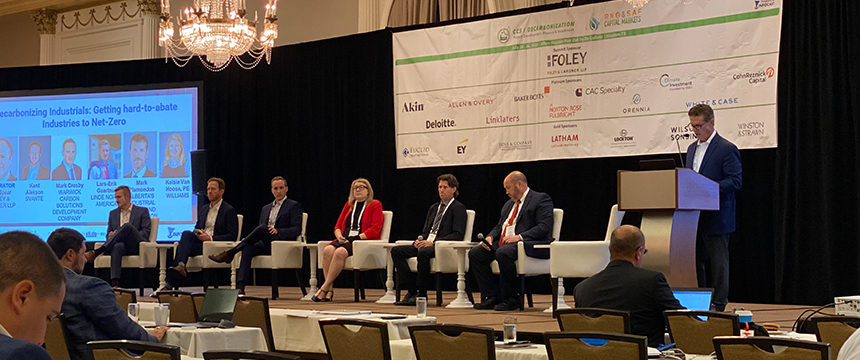CCUS Plays a Critical Role in Responsibly Meeting the World’s Energy Needs

Foley & Lardner LLP served as the summit sponsor at Infocast’s CCS/Decarbonization Project Development, Finance and Investment Summit which was held in Houston on July 25 and 26. Eric Blumrosen had the pleasure of serving as the summit’s co-chair. He was impressed with not only the knowledge and insight of the various presenters and panelists, but from the abundance of energy and enthusiasm from this group in what is for all practical purposes, the founding of a nascent industry.
Fellow partner Sarah Slack co-chaired the summit with Eric, while additional Foley attorneys presented on Qualifying Beginning of Construction Section 45Q Tax Credits (Victoria Roessler) and moderated a panel discussion on Decarbonizing Industrials (Tim Spear). Partner Kyle Hayes participated in the Infocast RNG + SAF Capital Markets conference, presenting on the Status and Outlook for RNG Production and Markets.
Before sharing a few takeaways from the summit, what is CCUS? It is essentially an array of technologies aimed at mitigating climate change by capturing carbon dioxide (CO2) emissions from industrial processes and power plants, utilizing CO2 for various applications, and storing it safely underground. According to a variety of experts, CCUS technologies will play a vital role in limiting global warming to 1.5 degrees Celsius above pre-industrial levels. Moreover, CCUS is also essential in enabling the sustainable use of fossil fuels during the transition to a low-carbon economy. The global energy industry is one that is predominantly based on fossil fuels and the need for energy is only growing. CCUS is a vital technology that allows us to meet our energy demands while concurrently lowering our carbon footprint. The International Energy Agency (IEA) estimates that without CCUS, the cost of meeting climate goals would increase by approximately 70%.
While the primary benefit of CCUS lies in its ability to significantly reduce greenhouse gas emissions, another advantage of CCUS is its potential to promote economic growth. Implementing CCUS technologies can create job opportunities and stimulate investment in research and development. In addition, CCUS can offer revenue streams through enhanced oil recovery projects, where CO2 is injected into oil reservoirs to boost oil production, and through other industrial uses.
Notwithstanding the benefits, CCUS faces significant challenges that hinder its broader adoption. Currently, the major obstacle is the permitting process for CCUS sequestration projects, which is long, costly and uncertain. Establishing a predictable regulatory framework for CCUS facilities involves complex legal and environmental considerations, which may vary across different jurisdictions. Streamlining and expediting the permitting process are essential to encourage more investment in CCUS projects.
Financing is another major challenge. Building and operating CCUS facilities require substantial upfront investments, and the financial viability of these projects can depend significantly on the availability of incentives and support, particularly with sequestration projects. Governments’ policies, including tax credits and other financial incentives, play a crucial role in attracting private investment in CCUS technologies.
With respect to tax credits, they have been an important driver for encouraging CCUS deployment. In the U.S., the 45Q tax credit incentivizes carbon capture projects, offering a financial incentive for each ton of CO2 captured and securely stored or used for enhanced oil recovery or other applications. However, the stability and longevity of such tax credits are essential to provide certainty to investors and ensure long-term commitment to CCUS projects which will last well beyond the tax credit scheme currently in place.
Despite the challenges, CCUS remains a crucial tool in the fight against climate change. To overcome barriers and foster its broader implementation, collaboration among governments, industries, and other stakeholders is necessary. Investing in research and development, promoting policy consistency, and supporting technological advancements are key factors in unlocking the full potential of CCUS and advancing toward a sustainable, low-carbon future.
